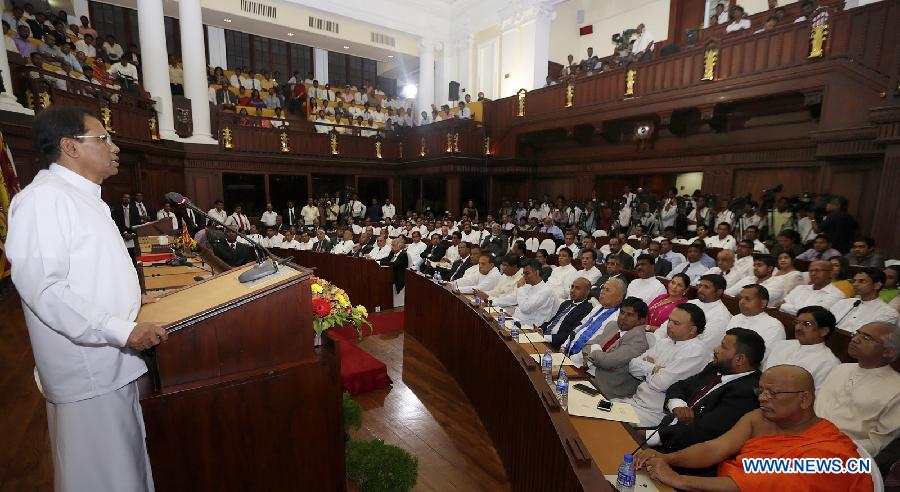Featured image courtesy constitutionnet
The constitutional reforms proposed by the new government have not been made public as yet, but already the likes of Wimal Weerawansa, Udaya Gammanpila and Dinesh Gunawardena from the opposition have started beating the communal drum. They appeal to the masses, to nip it in the bud and prevent the imminent division of the country, and the destruction of the people of ‘sinha ley’ – (Lion Blood) race and their religion a particular brand of Buddhism, they call ‘Sinhala Buddhism’ although the Buddha’s teachings are universal, for according to him there s only one race – the Human Race. It remains to be seen whether the people are willing to dance to this communal drum beat, even after a communal war that raged for 30 long years and made this Buddhist Country look like a killing field.
As pointed out by Gopalkrishna Gandhi in his speech made on the first anniversary of President Sirisena’s electoral victory, “If the Ponnambalams and Chelvanayagams had not been disappointed, spurned and marginalized, Velupillai Prabakaran would not have risen”. The Bandaranayake – Chelvanayagam pact, the Dudley – Chelvanayagam pact and Chandrika Bandaranayakes ‘package’ to introduce a ‘union of regions’ were all attempts made by the then government in power to solve the protracted ‘ethnic problem’ . They did not succeed because the other major party in the parliament opposed it, in the name of nationalism and patriotism. Today for the first time in the political history of Sri Lanka, the two majority parties (SLFP-UNP) have agreed to share power and work together. In addition they have the support of the two major minority communities the Tamils and Muslims. Therefore it seems to be the right time to introduce constitutional amendments or a new constitution that will help bring about ethnic and religious harmony leading to peace and stability.
Apart from these politicians who act in their own self interest, there are also a few members of the Buddhist clergy, (Ven. Bengamuwe Nalaka Thera) who tell the people “Any anti-Sinhalese Buddhist Conspiracy (by the government) should be defeated. Sri Lankan culture is based on Buddhism – Our rulers should not destroy Buddhism. It should be fostered and protected by the constitution. Buddhist monks practice horoscope reading and perform rites and rituals to bless the people – it is part of our cultural heritage”. There is also Ven. Yakkalamulle Pawara Thera who is the chairman of the new party ‘Sinhale Jathika Balkamuluwa’ who says “It has been formed to safeguard the identity of the Sinhala people and to regenerate the supremacy and pride of the Sinhala people “
Instead of inciting another racial riot what these monks should be really telling their followers is that Sri Lanka is a multi ethnic, multi religious country and unless all its people are treated as equals, and one section of our society does not continue to remain disgruntled and unhappy, there can be no peace in the country. When they see villagers in the North, still suffering in IDP camps, for almost 30 long years and the estate workers affected by landslides (Meeriyabadde) still remaining homeless or the other workers living in ancient ‘line rooms’ with leaking roofs and cracking walls, don’t our political and religious leaders feel a sense of shame? It is only in Sri Lanka that plantation workers have always remained below the poverty line without even basic facilities like water and sanitation. In Kerala for instance tea plantation workers live in separate units with attached bath rooms and gas cookers in their kitchens. In comparison our estate workers of Indian origin have been treated almost as slaves who don’t need any better living conditions.
President Maithripala Sirisena and the Prime Minster seem to be honest and sincere in their attempts to bring about peace and stability to the country by treating all citizens as equals and preventing the re-emergence of violence. But to achieve that goal they not only need the support of the Parliament but also that of the people and it’s really the people who can bring pressure on their MPs to support the constitutional reforms.
With this in mind, the government has appointed a “Public Representation Committee”, headed by Lal Wijenayake, which was to start work on January 17th, and its members are expected to cover all districts. While collecting submissions they will also hopefully, educate the public and races awareness among them so that they make the correct choice, when it comes to voting, as they did on January 8th, 2015. The Prime Minister has already assured the people that the country will never be divided and Buddhism will not lose its foremost place in the constitution. People should be given the correct information, that majority of Tamils reject the idea of a separate state and the Buddha’s Dhamma does not really need anyone’s protection. If ‘Sinhala Buddhists will only practice the Dhamma as taught by the Buddha, that alone will protect Buddhism. Unfortunately, what is being taught by the majority of monks and practiced by their followers is not what the Buddha taught. Horoscope reading and all the rites and rituals performed by the monks are part of the Brahmin – Hindu Culture. Prince Siddhartha himself was born into a Hindu family but in his journey towards enlightenment he rejected all these rituals and rites, including those based on the caste system.
We can only hope that the people will make the correct choice, at the referendum which will only come finally after the proposals have been passed by a two thirds majority in parliament which would be converted into a constituent (Constitutional) assembly, if agreed by all 225 members.
